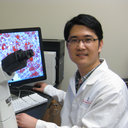Lack of testicular seipin causes teratozoospermia syndrome in men.
Açar sözlər
Mücərrəd
Obesity impairs male fertility, providing evidence for a link between adipose tissue and reproductive function; however, potential consequences of adipose tissue paucity on fertility remain unknown. Lack of s.c. fat is a hallmark of Berardinelli-Seip congenital lipodystrophy type 2 (BSCL2), which is caused by mutations in BSCL2-encoding seipin. Mice with a targeted deletion of murine seipin model BSCL2 with severe lipodystrophy, insulin resistance, and fatty liver but also exhibit male sterility. Here, we report teratozoospermia syndrome in a lipodystrophic patient with compound BSCL2 mutations, with sperm defects resembling the defects of infertile seipin null mutant mice. Analysis of conditional mouse mutants revealed that adipocyte-specific loss of seipin causes progressive lipodystrophy without affecting fertility, whereas loss of seipin in germ cells results in complete male infertility and teratozoospermia. Spermatids of the human patient and mice devoid of seipin in germ cells are morphologically abnormal with large ectopic lipid droplets and aggregate in dysfunctional clusters. Elevated levels of phosphatidic acid accompanied with an altered ratio of polyunsaturated to monounsaturated and saturated fatty acids in mutant mouse testes indicate impaired phospholipid homeostasis during spermiogenesis. We conclude that testicular but not adipose tissue-derived seipin is essential for male fertility by modulating testicular phospholipid homeostasis.



